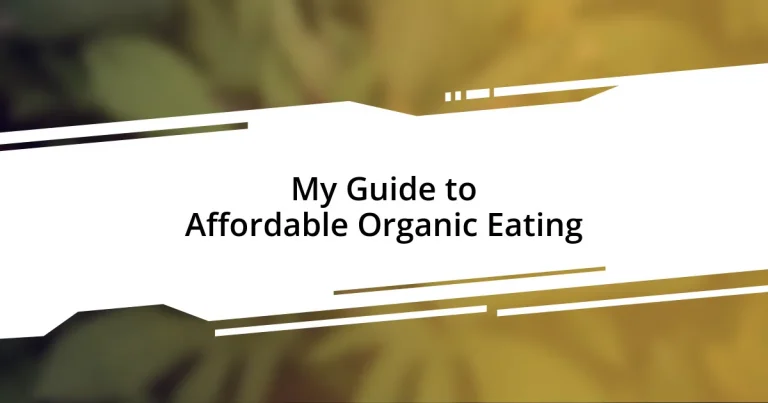Key takeaways:
- Organic food is produced without synthetic chemicals, supporting sustainable farming practices that benefit soil health and biodiversity.
- Choosing organic offers nutritional advantages, enhanced flavor, and helps support local farmers and communities.
- Budget-friendly options include shopping at local markets, buying in bulk, and exploring store brand organic products.
- Implementing meal planning and simple cooking techniques can maximize the benefits of organic ingredients while minimizing waste.
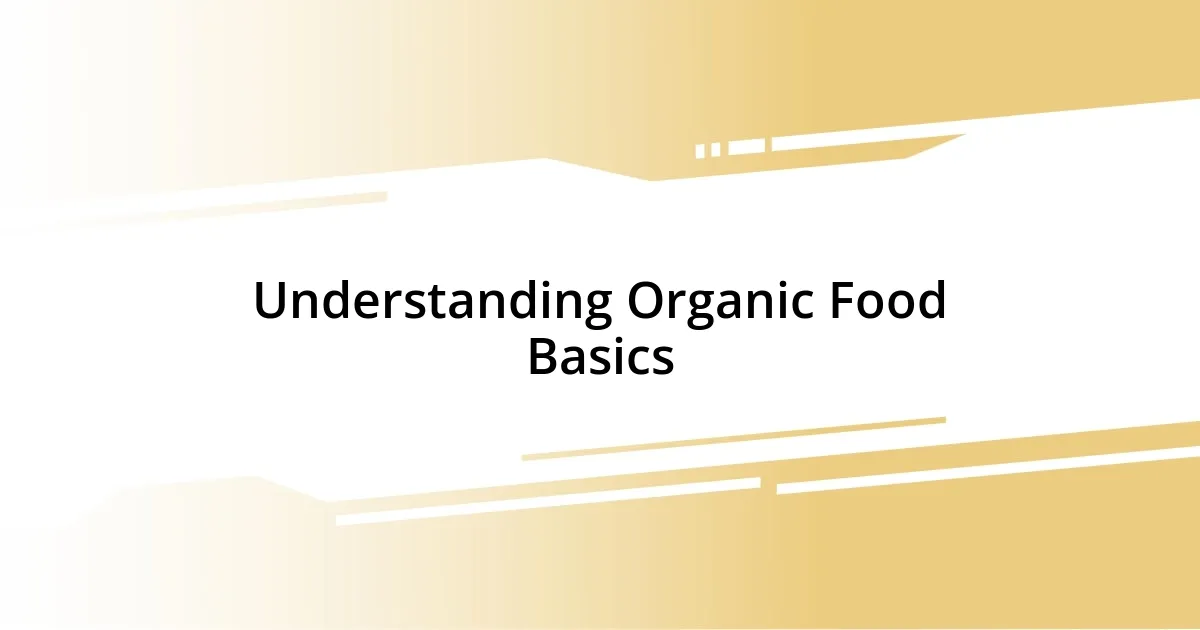
Understanding Organic Food Basics
Understanding the basics of organic food starts with recognizing what it truly means. Organic food is produced without synthetic fertilizers, pesticides, or genetically modified organisms (GMOs), which can make it feel like a more genuine option. I remember walking through the aisles of my local farmer’s market, feeling a sense of trust and pride as I selected produce that was nurtured naturally. Isn’t it comforting to know that what you’re putting into your body has been grown without harmful chemicals?
When you choose organic, you’re investing in sustainable farming practices that focus on soil health and biodiversity. I often think about how my choices ripple out – like when I chose a vibrant head of organic kale over a conventional one and savored the difference in flavor and freshness. Have you ever tasted something that just felt wholesome? It’s like a connection to the earth, and that’s part of what makes organic food appealing.
There’s also the important aspect of nutrition. Studies suggest that organic foods may have higher levels of certain nutrients, which is something I take seriously. I find myself constantly asking, “Isn’t it worth it to prioritize quality over quantity?” When you know your food is cultivated for its health benefits rather than just cost efficiency, it can shift the way you think about eating.
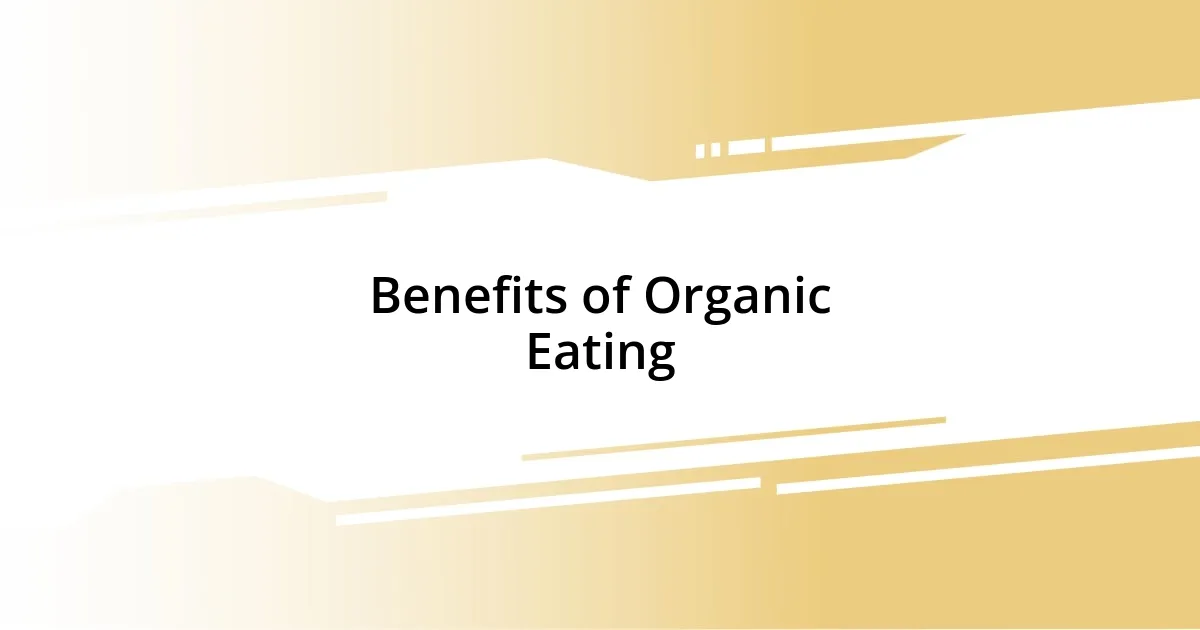
Benefits of Organic Eating
Choosing organic has so many wonderful benefits that often go beyond just what’s on your plate. For me, the emotional connection I feel when I consume organic food is profound. It’s not merely about nutrition; it’s also about knowing I’m supporting a system that respects our planet. I remember the first time I bit into an organic tomato; the burst of flavor was unlike anything I had tasted before. That experience has shaped my perspective—food should be a celebration of nature, not just fuel.
Here are some specific benefits of eating organic:
- Better Nutrition: Organic produce often boasts higher levels of antioxidants and essential nutrients.
- No Harmful Chemicals: By choosing organic, you minimize exposure to synthetic pesticides and fertilizers.
- Environmental Impact: Organic farming encourages biodiversity and sustainable practices that protect our ecosystems.
- Support Local Farmers: Buying organic often means supporting local farmers and communities, strengthening our connections.
- Enhanced Flavor: Many people, myself included, find that organic foods taste fresher and more vibrant.
Every time I indulge in organic foods, I am reminded that these choices contribute not just to my health, but to a broader purpose. It adds a layer of satisfaction that conventional options simply can’t match.

Budget Friendly Organic Options
When shopping for organic produce on a budget, I often turn to local co-ops or farmers’ markets. These places not only provide a variety of organic options but also tend to have better prices than mainstream grocery stores. I recall a Saturday morning when I stumbled upon a basket of ripe organic strawberries priced significantly lower than I’d seen elsewhere; it felt like a little victory. Could there be a sweeter way to enjoy seasonal fruits while saving some cash?
Another great option is to purchase organic items in bulk. I’ve discovered that many online retailers and local stores offer discounts when you buy larger quantities. For example, stocking up on organic grains or beans can be budget-friendly and will keep you well-fed for weeks. Plus, it’s a satisfying feeling to fill my pantry with wholesome staples. Have you ever felt the comfort of knowing you have a stockpile of healthy food ready to go? It’s like building a castle for healthy eating.
Also, exploring store brands can yield affordable organic choices. I initially hesitated to try store brands, but one day, I picked up some organic yogurt from my supermarket’s label, and I was amazed at how much I enjoyed it. The taste was comparable to more expensive options, but my wallet thanked me for the savings. So, don’t shy away from these alternatives; they can provide the same quality at a fraction of the price.
| Budget Friendly Option | Benefit |
|---|---|
| Local Farmers’ Markets | Fresh produce and better prices |
| Buying in Bulk | Cost savings and long-term supplies |
| Store Brand Organics | High quality at lower prices |

Shopping Tips for Organic Products
When it comes to shopping for organic products, I’d suggest starting by making a list before heading out. I often find that having a clear idea of what I need helps me stay focused and avoid impulse buys. There’s a strange satisfaction I get from checking off items on my list, especially when I find everything I wanted without wasting time wandering the aisles. Have you ever left a store only to realize you forgot half of your intended purchases? It’s a common scenario that a simple list can help prevent.
Another tip I swear by is to prioritize seasonal produce. Buying organic fruits and vegetables that are in season not only supports local farmers but often costs less than out-of-season items. I remember wandering through a bustling farmer’s market, feeling awe as I picked up vibrant zucchini, freshly harvested and perfectly priced. I could almost feel the sunshine on those veggies. Isn’t it amazing how seasonal choices connect us back to nature and make our meals more vibrant?
Finally, don’t shy away from reaching out to store staff for recommendations or even looking for organic discounts on the shelves. I once struck up a conversation with a store employee who pointed me to a section of organic products on sale that I wouldn’t have noticed otherwise. It felt like uncovering a hidden treasure! Engaging with staff can open up options you might’ve overlooked and makes the shopping experience feel a bit more personalized. Have you spoken to anyone at a store and walked away feeling like you discovered something truly special?
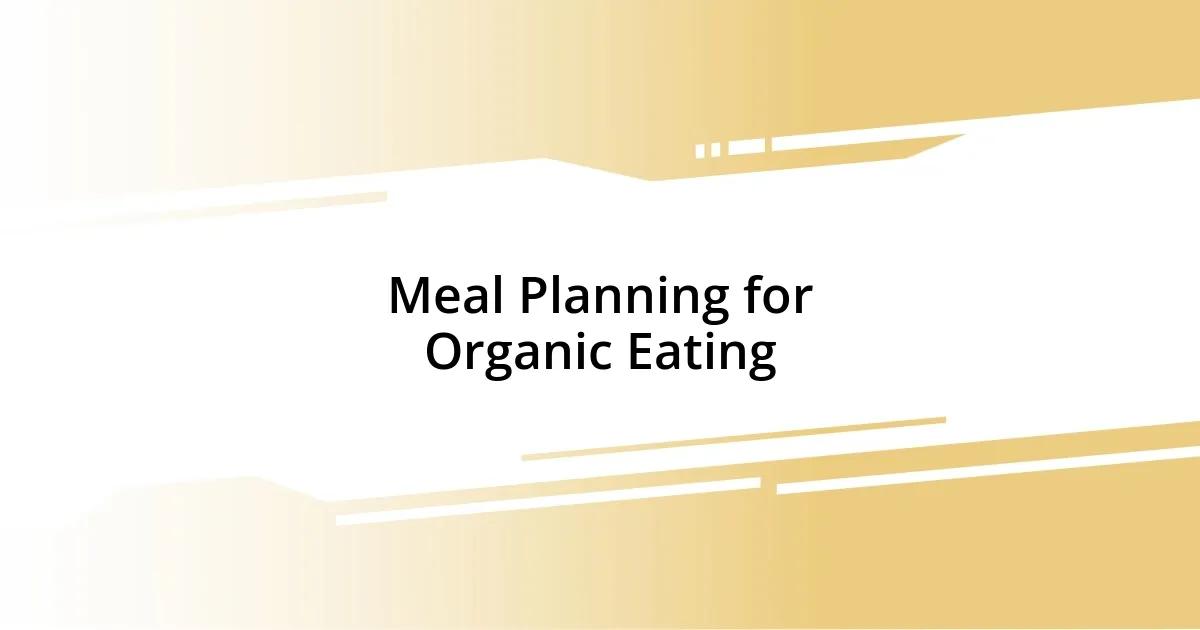
Meal Planning for Organic Eating
Meal planning for organic eating is a game changer, especially when aiming to stay within budget. I often dedicate my Sunday afternoons to cooking and preparing meals for the week ahead. It not only saves time during busy weekdays but allows me to use organic ingredients efficiently, minimizing waste. Have you ever felt the relief of opening your fridge and seeing prepped meals ready to go? It’s like a culinary safety net!
One approach I’ve found particularly effective is creating themed meals for the week. For instance, I might designate Monday as “Meatless Monday” with a hearty organic chickpea curry and Tuesday as “Taco Tuesday” with fresh produce from the local market. This not only keeps things interesting but also allows me to maximize the use of my organic purchases, ensuring that nothing goes bad. Have you tried this method? It can transform the mundane into a flavorful adventure.
Additionally, utilizing bulk ingredients in various recipes can stretch your organic budget. A while back, I bought a large bag of organic quinoa, which I initially thought was a splurge. However, I adapted it into salads, soups, and even breakfast bowls. It’s incredibly satisfying to see how far these bulk ingredients can stretch, and let me tell you, there’s nothing quite like preparing a delicious meal from items you know are good for your body and the planet. Isn’t it amazing how thoughtful planning can change your approach to eating?
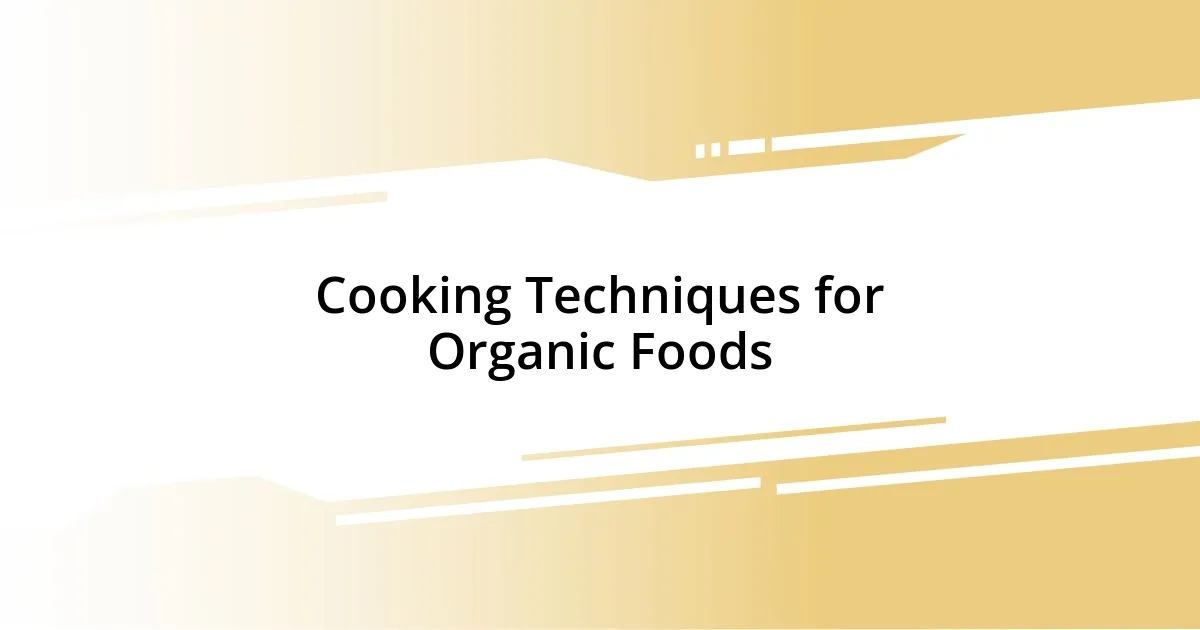
Cooking Techniques for Organic Foods
One of the most valuable techniques I’ve embraced for cooking organic foods is steaming. It allows vegetables to retain their vibrant colors and essential nutrients. I recall the first time I steamed fresh organic broccoli; the aroma filled my kitchen, and the bright green florets looked almost too beautiful to eat. Have you ever tasted fresh veggies prepared this way? It’s a subtle reminder of how cooking can enhance the natural flavors of our food.
Another method I love is roasting. There’s something magical about tossing seasonal organic vegetables in olive oil, sprinkling them with herbs, and letting the oven do the work. The caramelization that occurs brings out flavors you never knew existed. I remember one chilly evening roasting a tray of organic root vegetables; the sweet smell wafted through my home, making it feel warm and inviting. It’s a comforting reminder that cooking can connect us to our food in meaningful ways. Have you felt that connection in your own kitchen?
Finally, don’t underestimate the power of soaking grains and beans before cooking. This simple technique not only enhances digestibility but also allows you to use organic ingredients at their best. When I started soaking chickpeas overnight for my favorite hummus, the difference was profound. The texture was so creamy and luscious compared to what I used to make without soaking. It made me wonder, how often do we overlook such straightforward techniques that can elevate our dishes? It’s these small adjustments that can lead to delicious, nourishing meals that you can genuinely feel good about.

Sustainable Practices for Organic Lifestyle
Sustainable practices in an organic lifestyle are all about making mindful choices that contribute to a healthier planet. One simple way I approach this is by creating a compost system in my kitchen. Every time I peel veggies or chop up fruit, I toss the scraps into my compost bin. It’s satisfying to think that those leftovers will transform into nutrient-rich soil for my garden. Have you ever considered how much waste we produce and how composting can close that loop?
Another effective practice I’ve adopted is supporting local growers through community-supported agriculture (CSA). Joining a CSA not only connects me with my community but also ensures I receive fresh, organic produce each week. I remember the excitement of the first box I received filled with colorful, seasonal vegetables. It felt like opening a treasure chest of flavors! Do you ever feel disconnected from where your food comes from? Joining a CSA can bridge that gap, fostering a deeper appreciation for the journey of our food from farm to table.
I’ve also found that being mindful of packaging is crucial. I try to bring my reusable bags and glass containers to the market, reducing single-use plastics. Just the other day, while shopping for organic bulk grains, I felt proud to see my containers filled to the brim instead of relying on pre-packaged options. It’s a small step, but doesn’t it feel empowering to know you’re making choices that are better for the earth? Embracing these sustainable practices not only enriches my organic lifestyle but also nurtures a sense of responsibility towards our planet.












